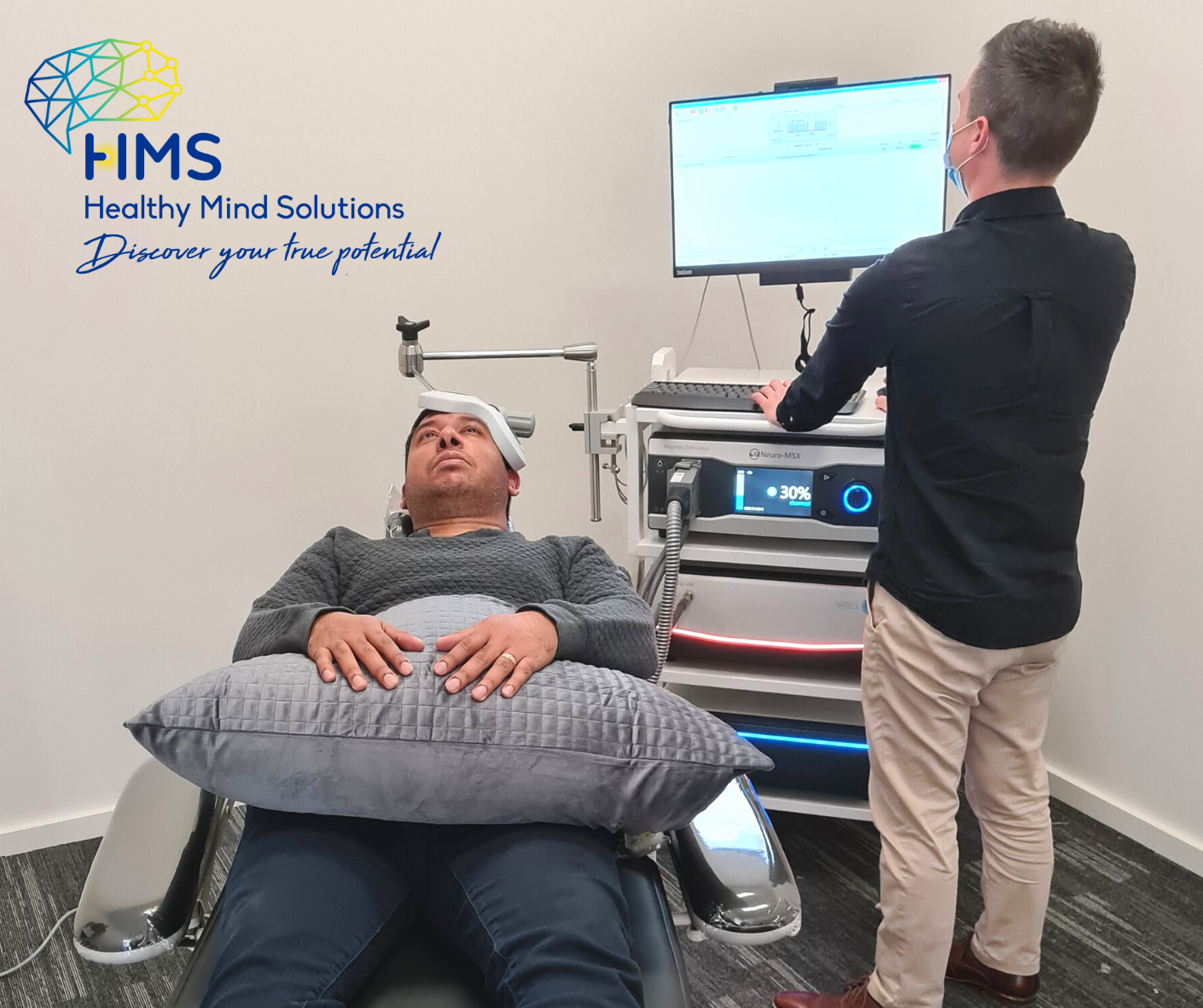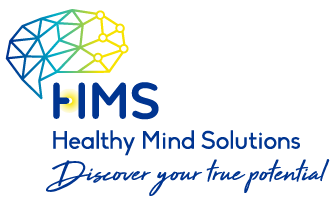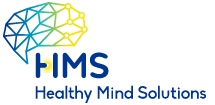Repetitive Transcranial Magnetic Stimulation (rTMS)
Repetitive Transcranial Magnetic Stimulation (rTMS) is a safe and non-invasive mild form of brain stimulation using magnetic fields. It involves placing a simple coil on the head which produces repetitive high and low-intensity magnetic pulses used to stimulate specific deep brain regions. When these pulses are administered in rapid succession, they can produce longer lasting changes in brain activity.
The pulses generated are of the same type and strength as those generated by magnetic resonance imaging (MRI) machines.
While receiving treatment, the patient is fully awake. rTMS is usually well-tolerated with minimal side effects. There is no need for any anaesthetic or sedation and there are no adverse effects on memory and thinking ability.
rTMS is predominately used as an effective treatment for patients with depression who have not benefitted from antidepressant medications or cannot tolerate antidepressant medications due to side-effects.
rTMS is used to treat various psychiatric and neurological disorders. However, at Healthy Mind Solutions rTMS can be used to treat the following:
Depression
Chronic Pain (Migraines, Neuropathic Pain, Fibromyalgia)
Addiction (Nicotine) Cessation
Healthy Mind Solutions follows the Royal Australian and New Zealand College of Psychiatrists (RANZCP) professional practice guidelines for the administration of rTMS.
Click HERE for the Department of Health rTMS Patient Factsheet.
Click HERE for rTMS information from The Royal Australian & New Zealand College of Psychiatrists (RANZCP).
Click HERE for “What is Transcranial Magnetic Stimulation treatment for depression? Explained” by Black Dog Institute.
Please see below for additional resources, journal articles and YouTube videos on rTMS.
If you would like to find out more about your suitability for rTMS therapy, please see your GP for a referral to our psychiatrists to book an initial consultation.
Frequently Asked Questions
-
rTMS therapy is recommended for patients when other interventions, such as psychological therapy and medication, have been unsuccessful.
A thorough psychiatric and medical assessment is required before treatment is commenced. After assessment, our psychiatrists will discuss your individual suitability for rTMS therapy.
-
Data on real-world effectiveness in the United States reported response rates of 58–83% and remission rates of 28–62% for rTMS treatment of depression (Sackeim et al., 2020). Click HERE for full article.
-
If you do respond to rTMS therapy, it may take a few weeks to start noticing changes.
We encourage all patients to complete the entire initial course before determining if rTMS therapy has been successful.
To help determine if rTMS therapy has been effective for you, our rTMS technicians administer standardised questionnaires throughout your treatment course.
Most patients who have a positive response to rTMS therapy experience ongoing or indefinite positive effects for years after treatment. If at any stage a decline or relapse occurs, you can book a review consult with your treating psychiatrist to discuss and a maintenance course may be recommended.
-
rTMS is a safe treatment which has been used and studied for over 30 years. There are no long-term side effects to rTMS and while short term side effects may occur during the treatment, they are unlikely to affect the course of the treatment.
Short term side effects may include scalp discomfort or headache around the placement of the coil, and passing tiredness. These are usually minor and do not stop patients from going about their day-to-day life.
Before commencement of treatment, you will be provided with comprehensive information about side effects and your individual risk factors will be discussed with your treating psychiatrist or rTMS technician.
-
Generally, rTMS therapy is broken down into treatment courses.
The initial (or acute) treatment course typically consists of 35 rTMS sessions.
Maintenance treatment courses typically consist of 15 rTMS sessions.
Occasionally, based on individual circumstances and response to treatment your treating psychiatrist may recommend altered maintenance courses such as "cluster maintenance". These typically involve 3-5 rTMS sessions for 1 week every month.
-
At Healthy Mind Solutions, your rTMS therapy is administered by Nurses who have obtained RANZCP endorsed rTMS Certification from Neurocare. They are also referred to as rTMS Therapy Technicians or Accredited rTMS Practitioners.
Your treating Psychiatrist will also be in attendance for part of your first session.
All Doctors and Nurses at Healthy Mind Solutions maintain current First Aid and CPR certification.
-
Throughout your treatment course you will have 4 scheduled psychiatric reviews with your treating psychiatrist to monitor your progress.
These usually occur at session 10, 20, 30 and course completion. However, do differ slightly for treatment of some conditions or based on individual circumstances.
Additional reviews can be requested at any stage of treatment. Additional fees may apply for these.
-
You will be awake through your whole session and your rTMS technician will be in the room with you at all times. If you have any concerns during the treatment, the treatment can be stopped immediately.
Treatments are done while you are sitting/laying in a comfortable chair and you will be offered earplugs and a neck pillow for your comfort. The rTMS machine makes a ticking noise, which is similar to an MRI machine.
In the first session the rTMS technician will take some measurements of your head and find the resting motor threshold to determine the optimal location and dose for your treatments. During future sessions the rTMS technician will continue to take measurements of your head to ensure that they target the same optimal location at each treatment.
Your rTMS technician will then administer several brief pulses to determine the appropriate amount of energy required. This varies between patients.
Once this is determined, the coil will be positioned over the front region of your brain, touching the scalp, the treatment will then commence.
During treatment your rTMS technician will engage in conversation with you or if you prefer we also have fidget toys and activities available for you. Some patients even enjoy a little nap!
-
Some patients experience tingling or a tapping session on the scalp in the area being treated. This sensation usually subsides over the first few sessions as they get used to it.
-
A treatment session will typically run for about 20 - 30 minutes. At some sessions throughout your course, we will complete a standardised questionnaire to track your progress - these sessions may take a little longer.
-
For treatment of depression your rTMS sessions will be 5 days per week for 7 weeks totaling 35 sessions in total.
If clinically appropriate, patients can undergo 2 sessions per day with a minimum of 2 hours between sessions to shorten the total treatment length. Please discuss this possibility with your treating psychiatrist for them to assess your individual circumstances.
Session frequency to treat other conditions varies based on the individual and their response.
-
For the best chance for treatment to be effective, we strongly encourage all patients to ensure they are fully committed to attend all appointments. However, we understand that sometimes things happen that cannot be helped, such as illness.
Please do not attend your session if you are unwell.
Additional sessions can be added to the end of your treatment to make up for missed sessions.
Cancellation fees may apply for missed sessions in some circumstances.
-
Yes, absolutely! After your session you can continue your day as usual.
-
Medicare will subsidies the majority of the fees for eligible patients receiving treatment for depression only. There will still be some out of pocket costs - these can vary if you have reached your Medicare threshold for the year.
Some third party insurers may also cover the cost of rTMS including WorkCover, TAC and DVA. An application for prior approval is usually required for third party funding before commencing treatment. Our team can assist you with this after your initial psychiatric consultation.
NDIS do not cover rTMS Therapy.
Treatment for conditions other than depression are generally privately funded.
Please contact our admin team for further information on rTMS fees.
-
If you are eligible, Medicare rebates will be available for:
• 35 rTMS sessions for an initial (acute) course of treatment; and
• 15 rTMS sessions for a maintenance course of treatment.
A maintenance course of treatment can only be undertaken 4 months after the completion of the initial treatment course.
Medicare will only subsidies a total of 50 rTMS sessions in a persons lifetime.
-
Firstly, you must be eligible for Medicare. You must also meet the following criteria:
• Be at least 18 years of age;
• Be diagnosed with major depressive episode;
• Have failed to receive satisfactory improvement for the major depressive episode despite the adequate trialing of at least two different classes of antidepressant medications, unless contraindicated;
• Have also undertaken psychological therapy unless inappropriate; and
• Have not received rTMS treatment previously in either a public or private setting.
Additional rTMS Resources
-
-
Australian Journal of General Practice
Volume 47, Issue 3, March 2018
Click HERE to read the full article
-
Clinical outcomes in a large registry of patients with major depressive disorder (MDD) treated with Transcranial Magnetic Stimulation
Click HERE for full article
-
Repetitive transcranial magnetic stimulation for neuropathic pain: a randomized multicentre sham controlled trial
Click HERE to read the full article
-
New updates on transcranial magnetic stimulation in chronic pain
Click HERE for the full article
-
Transcranial Magnetic Stimulation for Long-Term Smoking Cessation: Preliminary Examination of Delay Discounting as a Therapeutic Target and the Effects of Intensity and Duration
Click HERE to read the full article
-
Efficacy of non-invasive brain stimulation (NIBS) interventions in reducing smoking frequency in patients with nicotine dependence: a systematic review and network meta-analysis of randomized controlled trials
Click HERE for the full article





